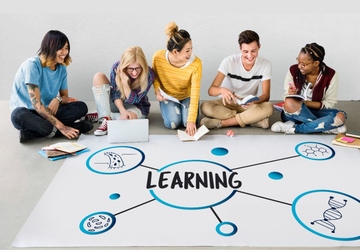Lifelong learning is the ongoing, purposeful pursuit of knowledge for personal and professional development. Continuing education can expand your skills, accelerate your career, and improve your well-being. Here are some tips for lifelong learning that can help you ignite and maintain your motivation.
Benefits of Continuous Learning
Lifelong learning has many benefits that can have a lasting impact on all aspects of your life. Some of the main benefits of continuous learning are:
- Improved cognitive abilities: Continuous learning keeps your mind sharp and enhances your cognitive abilities.
- Career development: Acquiring new skills and knowledge can open up unprecedented career opportunities and increase earning potential.
- Personal advancement: Continuous training promotes personal development and fosters a sense of accomplishment.
- Social connections: Acquiring new knowledge can build new relationships and establish valuable networks.
Strive to Acquire Continuous Knowledge

There are many ways people can acquire knowledge continuously. Here are some practical ways you can start your adventure:
1. Set Educational Goals
Set clear and achievable cognitive goals. This gives you direction and motivation. Your goals may be related to your job, hobbies, or interests. For example, you might strive to learn a new language, master a musical instrument, or improve your professional skills.
2. Take Online Courses
Online courses offer a convenient way to become a lifelong learner. Many platforms offer a wide selection of courses on a variety of topics. Sites such as Coursera, Udemy, and LinkedIn Learning offer high-quality courses taught by experts.
3. Read Regularly
Reading is one of the most effective techniques for lifelong learning. Consider reading books, articles, and magazines related to your interests and career. This way, you can stay updated with the latest trends and developments.
4. Attend Workshops and Seminars
Workshops and seminars offer opportunities for experiential learning and networking. Attend events that match your learning goals to gain new insights and interact with like-minded people.
5. Join a Learning Community
Membership in a learning community can provide support and motivation. Join forums, study groups, or social media groups focusing on lifelong learning techniques and interesting topics.
6. Practice What You've Learned
Applying newfound knowledge is essential for retaining information and honing new skills. Apply what you've learned to real-world scenarios, whether at work or in personal projects.
7. Stay Curious
Curiosity is the fundamental driver of continuous learning. Always ask questions and try to understand the "why" behind things. This curious attitude will keep you engaged and open to new learning opportunities.
8. Use Mobile Apps
In this age of digital advancement, mobile apps offer an efficient and pragmatic way to engage in lifelong learning. Many learning apps cover a variety of interests and skill levels. Apps like Duolingo for language learning, Khan Academy for academic subjects, and Skillshare for creative activities offer many resources to promote ongoing education.
9. Explore Educational Podcasts
Podcasts have become a popular medium for outpatient learning. Educational podcasts cover various topics, from history and science to personal development and business strategy. You can seamlessly integrate lifelong learning skills into your daily life by listening to these podcasts while driving or exercising.
10. Participate in Online Communities
Online communities, including forums and social media, are invaluable for lifelong learning. Platforms such as Reddit, Quora, and dedicated Facebook groups provide opportunities for research, knowledge dissemination, and topical discussions with experts and enthusiasts. This collaborative environment promotes deep understanding and diverse perspectives.
11. Playful Learning
Gamified learning incorporates elements of playfulness into educational activities, making learning more fun and interesting. Many platforms use points, badges, and leaderboards to motivate learners. This approach can help acquire new skills and knowledge that are more interactive and fun, and consistent with the secret of lifelong learning.
12. Attend Virtual Conferences
Virtual conferences and webinars are becoming increasingly convenient, providing opportunities to learn from industry leaders and experts regardless of geographic location. These events often feature interactive sessions, question-and-answer sessions, and networking opportunities. This makes them an excellent resource for lifelong learning.
13. Engage in Experiential Learning
Experiential learning emphasizes learning through practice and reflection. Activities such as internships, volunteer work, and hands-on projects provide hands-on experience and deepen understanding. This immersive approach is the cornerstone of continuous learning.
14. Take a MOOC (Massive Open Online Course).
MOOCs offer free or affordable courses from renowned universities and institutions worldwide. Platforms such as edX and FutureLearn offer a variety of topics so you can engage in lifelong learning at your own pace and needs.
15. Practice Peer Learning
Peer learning involves the mutual exchange of knowledge and skills between equals. Study groups, employee collaborations, and peer review meetings foster collaborative learning environments. This approach improves understanding and retention through active engagement and dialogue.
Tips for Successful Lifelong Learning

To maximize the benefits of continuous learning, consider the following tips for lifelong learning:
- Be consistent: Integrate learning into your daily life. Consistency is essential for making progress.
- Stay organized: Track your learning goals, resources, and progress using tools such as planning tools or digital apps.
- Be open-minded: Be open to new topics and perspectives. This openness will enrich your learning experience.
- Get feedback: Regularly from colleagues, mentors, or teachers. Constructive feedback can lead to improvement and growth.
- Reflect on your learning: Take time to reflect on your learning. This reflection helps consolidate knowledge and identify areas for further exploration.
Overcoming Lifelong Education Pain Points
There can be various barriers to participating in ongoing educational endeavours. Here are strategies for overcoming typical barriers:
- Time responsibilities: Balancing an educational program with additional commitments can be difficult. Prioritize your educational goals and set regular intervals of academic engagement.
- Motivational continuity: Maintaining motivation over a longer period of time is a big challenge. Set mid-term goals and praise their implementation.
- Cognitive saturation: The sheer volume of accessible data can overwhelm learners. Start by focusing on one topic and methodically broaden your knowledge horizons.
- Resource availability: Access to resources can be a limitation. Look for free or low-cost learning materials and use library resources.
Conclusion
Lifelong learning is an effective way to improve your personal and professional life. By following these lifelong learning tips and exploring different learning methods, you can reap the numerous benefits of continuous learning. Remember to set goals, stay curious, and apply your newly acquired knowledge to maximize the impact of your lifelong learning journey.
